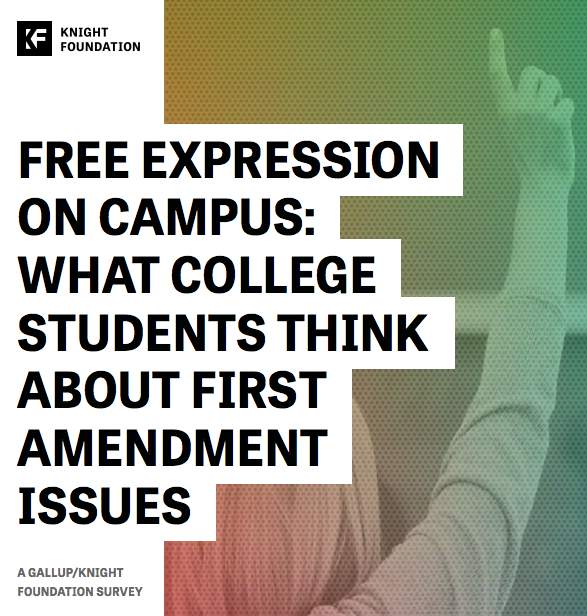First Amendment freedoms continue to be tested on U.S. college campuses as higher education institutions strive to achieve sometimes competing goals. These include encouraging the open discussion of ideas and exposing students to people of different backgrounds and viewpoints while making all students feel included and respected on campus.
In 2016, Gallup, the John S. and James L. Knight Foundation and the Newseum Institute conducted a landmark, nationally representative study of college students. The survey found students believed First Amendment freedoms were secure, and they generally preferred that campuses be open environments that encourage a wide range of expression. However, students did support restrictions on certain types of speech, such as hate speech, and many were sympathetic to student attempts to deny the press access to campus protests, such as those that occurred over race-related issues in the 2015-2016 school year.
The past year-and-a-half saw tensions over free expression and inclusiveness escalate amid the contentious 2016 presidential election, student objections to invited commencement speakers and a series of violent confrontations on college campuses when controversial speakers or groups expressed their views on campus.
In 2017, Gallup, the Knight Foundation and the American Council on Education partnered with the Charles Koch Institute and the Stanton Foundation to update key trends from the 2016 survey and ask about new developments in First Amendment issues. The new survey probed whether college students ever consider violence or shouting down speakers acceptable, whether they believe certain groups of students can freely express their views on campus and whether social media has displaced public areas of campus as the venue for discussing political and social issues.
The survey of 3,014 U.S. college students, including an oversample of 216 students at Historically Black Colleges and Universities (HBCUs), was conducted November 1-December 10, 2017.[1]
Some of the key findings of the study include:
Students value both free expression and inclusion, though their commitment to free expression may be stronger in the abstract than in reality. Majorities of students say protecting free speech rights (56%) and promoting a diverse and inclusive society (52%) are extremely important to democracy. Students continue to prefer campuses be open learning environments that allow for a wide range of views to be heard than to prefer environments that prohibit certain types of potentially harmful speech, though not as widely as they did in 2016.
When asked whether free expression or diversity and inclusion is more important, they tilt toward saying diversity and inclusion are. Students are as likely to favor campus speech codes as to oppose them, and they overwhelmingly favor free speech zones on campus. Students do not believe the U.S. Constitution should protect hate speech, and they continue to support campus policies that restrict both hate speech and wearing stereotypical costumes.
Students have become more likely to think the climate on their campus prevents people from speaking their mind because others might take offense. More students now (61%) than in 2016 (54%) agree that the climate on their campus prevents some students from expressing their views. Although a majority of college students, 69%, believe political conservatives on campus are able to freely and openly express their views, many more believe political liberals (92%) and other campus groups are able to share their opinions freely.
College students say campus expression has shifted online. More students say discussion of social and political issues mostly takes place on social media (57%), rather than in public areas of campus (43%). At the same time, an increasing percentage of college students agree that social media can stifle free expression because people fear being attacked or blocked by those who disagree with their views. Also, eight in 10 students agree that the internet has been responsible for an explosion in hate speech.
Extreme actions to prevent speakers from speaking are largely, but not universally, condemned. Ninety percent of college students say it is never acceptable to use violence to prevent someone from speaking, but 10% say is acceptable sometimes. Thirty-seven percent of college students also believe shouting down speakers is sometimes acceptable.
College students continue to view First Amendment rights as secure rather than threatened, but compared with the 2016 survey, they are less likely to view each right as secure. Sixty-four percent of college students say freedom of speech is secure in this country, down from 73% in 2016. Sixty percent, down from 81%, say freedom of the press is secure. College students continue to believe freedom of assembly is the least secure First Amendment freedom, with 57% (down from 66%) saying that right is secure.
These findings make clear the college students see the landscape for the First Amendment as continuing to evolve. And as those changes occur, college students, like the officials who oversee their campuses, sometimes struggle to reconcile the tensions that can occur between respecting individual freedoms and respecting individual differences.
[1] See the methodology section at the end of the report for more detail on the student sample and its characteristics.
